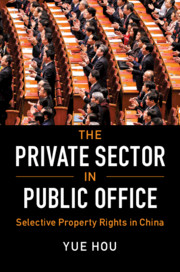Book contents
- Frontmatter
- Dedication
- Contents
- Figures, Tables, and Boxes
- Preface
- Acknowledgements
- Abbreviations
- 1 Introduction
- 2 Selective Property Rights
- 3 Private Entrepreneurs in Legislative Office
- 4 Motivations to Run
- 5 Protection from Predation
- 6 Legislator Status and Political Capital
- 7 Conclusion
- Bibliography
- Bibliography (with Chinese-Language References)
- Index
- Series
1 - Introduction
Published online by Cambridge University Press: 20 August 2019
- Frontmatter
- Dedication
- Contents
- Figures, Tables, and Boxes
- Preface
- Acknowledgements
- Abbreviations
- 1 Introduction
- 2 Selective Property Rights
- 3 Private Entrepreneurs in Legislative Office
- 4 Motivations to Run
- 5 Protection from Predation
- 6 Legislator Status and Political Capital
- 7 Conclusion
- Bibliography
- Bibliography (with Chinese-Language References)
- Index
- Series
Summary
This chapter underpins the book and presents the argument in summary. China's legislative system provides entrepreneurial actors with opportunities to advance their own interests. In joining local legislatures, private entrepreneurs are building a system of selective property rights. This chapter discusses contribution to the literature of property rights and economic growth, property protection and authoritarian institution. It then introduces the methodology and data. It ends with a roadmap for the rest of the book.
- Type
- Chapter
- Information
- The Private Sector in Public OfficeSelective Property Rights in China, pp. 1 - 16Publisher: Cambridge University PressPrint publication year: 2019

